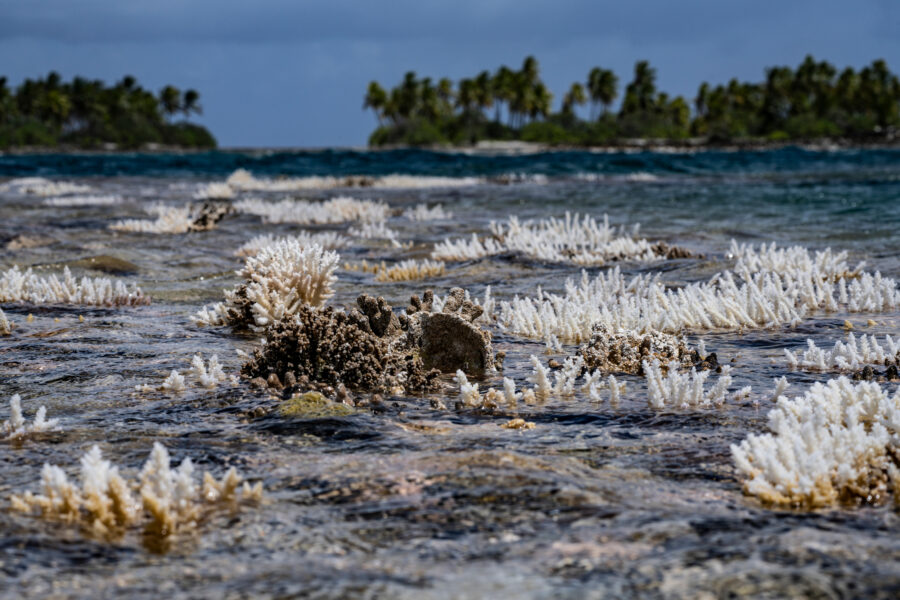The top scientist for the Geneva-based United Nations Environmental Programme said the organization is exploring the topic of climate engineering because “growing concerns about the lack of global efforts to cut emissions” is driving more interest in technological fixes that have been discredited by recent research.
“It’s naive to ignore a group of technologies that could have global implications,” said Andrea Hinwood, UNEP’s chief scientist.
Geoengineering broadly covers a wide range of mechanical or chemical methods to try to change the global climate system. It includes unproven concepts such as dimming sunlight by intentionally polluting the upper atmosphere with thousands of tons of artificial particles, including chemical sprays or mineral dust. The idea is to slow the rise of global or regional temperatures by deflecting some incoming solar energy away from Earth’s surface before it’s trapped as heat by atmospheric greenhouse gas pollution.
Variations of the concept are euphemistically referred to as solar radiation management (SRM), or, less diplomatically, climate hacking. UNEP held a series of four online meetings with more than 400 participants, two in May and two in early September, to address the issue because the organization “has a mandate to keep the environment under review [and] to identify emerging issues, and holds the power to convene meetings on relevant topics,” Hinwood said.
UNEP doesn’t consider “SRM technologies” as a climate solution, she said.
“They are largely speculative, and they do not address the underlying causes of climate change,” Hinwood said. “The only option we have is to actually address greenhouse gas emissions as a matter of urgency.”
Rising global tensions around climate impacts and climate justice were on full display from the start of the United Nations Environmental Programme workshop, as some scientists and members of conservation and climate protection groups charged that the panel hosted by UNEP was stacked with technical specialists who focus on advancing geoengineering research without enough consideration of the connected social and environmental issues, or understanding how efforts to alter the climate could backfire.
During the September workshops, Juan Moreno-Cruz, a climate researcher at the University of Waterloo in Canada, directly addressed the potential “moral hazard” of geoengineering. He warned that if the focus is on technical climate fixes, governments might “slack off” on cutting emissions.
Under the UNEP sessions’ current structure, the issue may focus too much on engineering aspects and push the world toward potentially dangerous experiments, said Silvia Ribeiro, a long-time conservation advocate, now with Alianza Bioversidad, a Latin American cooperative of sustainable agriculture and biodiversity groups, and until recently the Latin America director of the ETC Group, a global watchdog for geoengineering and biotechnology that warns about risks to people, communities and the environment.
“Almost all panelists selected by UNEP … want to establish a narrow way of evaluating the issue based only on comparing the risks of climate change to the dangers of SRM deployment,” she said.
There is widespread scientific agreement on the potential risks of sun-dimming technologies, but some forms of geoengineering should be explored to preserve options for future generations, famed climate scientist James Hansen wrote in a 2023 paper.
At the Sept. 11 workshop, panelist Frank Keutsch, a Harvard atmospheric researcher, said one of the important things to consider is, “how do the uncertainties of climate change itself compare to the uncertainties of geoengineering?”
Who Will Control the Global Thermostat?
Amos Nkpeebo, a researcher and climate activist with the Ghana-based FIDEP Foundation, which advocates for sustainable development, said he was disturbed that the most recent UNEP workshops seemed to ignore “the common position that SRM deployment is too dangerous and ungovernable, and hence must not be further developed,” he said.
Rather than enabling a slippery slope that could lead to intentional large-scale pollution of the atmosphere with chemical or mineral compounds, UNEP should focus all its efforts on preventing that from happening, Nkpeebo added.
The current public discussions in venues such as UNEP may not be keeping pace with rapid geopolitical changes or with rapidly cascading climate impacts, said Joshua Amponsem, a Ghanaian climate advocate and a former United Nations youth envoy, who expressed concerns that a rogue country might proceed with experiments without considering how it affects neighboring nations.
This story is funded by readers like you.
Our nonprofit newsroom provides award-winning climate coverage free of charge and advertising. We rely on donations from readers like you to keep going. Please donate now to support our work.
Donate NowAnd he said current geopolitical trends “make the possibility of solar geoengineering or SRM capture by authoritarian states no longer as far-fetched as today as it was a few years back.”
Moreno-Cruz added that geoengineering discussions resonate differently in a global “environment of hostility” with “rising authoritarian governance” around the globe, when more countries emphasize their own self-interest above international collaboration.
“How do we think of these technologies in a world in which we see democracy and institutions under attack, is very different from having this conversation in a world in which there are strong global institutions,” he said.
During the recent workshops, multiple participants noted that there already are international guidelines on geoengineering activities. The 2010 Convention on Biological Diversity established a de facto ban except for small-scale scientific research, which must be conducted with guidelines in place, as well as complete, public and transparent environmental and social assessments.
And two treaties administered by the International Maritime Organization, the London Convention and Protocol, and the U.N. Convention on the Law of the Sea, also regulate the discharge of materials into oceans, and regulate some aspects of ocean geoengineering.
Given the challenges of developing governance and understanding the full range of possible impacts, more than 580 scientists and thousands of civil organizations have signed on to a geoengineering non-use petition calling for a moratorium on the deployment of solar sun-dimming technologies and restrictions on public funding and outdoor experiments.
Recent research has shown that any intentional sun-dimming on a scale large enough to affect global temperature would have significant side effects.These could potentially shift rainfall patterns crucial for agriculture, intensify heat waves or cold snaps and lead to overall global drying, with less solar energy available to drive the water cycle.
It’s also clear that sun-dimming would not stop the ocean carbon dioxide buildup caused by human emissions, so ocean acidification, which is already damaging ecosystems, including coral reefs, would continue unabated.
Recent science has helped bolster global support for strict rules on solar geoengineering experimentation.
In July, all 54 African countries reaffirmed their support for the non-use agreement during the African Ministerial Conference on the Environment, emphasizing the “profound environmental, ethical, and geopolitical risks on a planetary scale that development and use of such technologies pose.”
“Solar radiation modification technology would be a very dangerous technology, not only to Africa, but to the world at large and would make Africa more vulnerable,” said Hibaa Ismael, a Kenya-based Djibouti diplomat who helped facilitate the unified African position on geoengineering.
As she learned more about geoengineering, she said, “At first, I thought I was in a bad sci-fi movie. It reminded me of all those movies where the world is shown as gloomy and dark and very much polluted. It’s a Pandora’s box that we might open and will not be able to close.”
Correction: This story was updated Sept. 17, 2025, to include the organization that Silvia Ribeiro is affiliated with.
About This Story
Perhaps you noticed: This story, like all the news we publish, is free to read. That’s because Inside Climate News is a 501c3 nonprofit organization. We do not charge a subscription fee, lock our news behind a paywall, or clutter our website with ads. We make our news on climate and the environment freely available to you and anyone who wants it.
That’s not all. We also share our news for free with scores of other media organizations around the country. Many of them can’t afford to do environmental journalism of their own. We’ve built bureaus from coast to coast to report local stories, collaborate with local newsrooms and co-publish articles so that this vital work is shared as widely as possible.
Two of us launched ICN in 2007. Six years later we earned a Pulitzer Prize for National Reporting, and now we run the oldest and largest dedicated climate newsroom in the nation. We tell the story in all its complexity. We hold polluters accountable. We expose environmental injustice. We debunk misinformation. We scrutinize solutions and inspire action.
Donations from readers like you fund every aspect of what we do. If you don’t already, will you support our ongoing work, our reporting on the biggest crisis facing our planet, and help us reach even more readers in more places?
Please take a moment to make a tax-deductible donation. Every one of them makes a difference.
Thank you,













